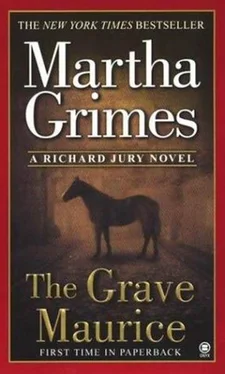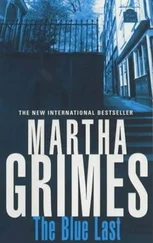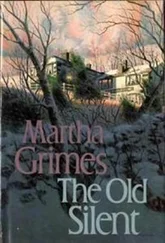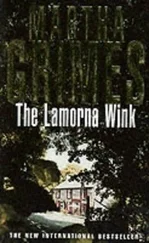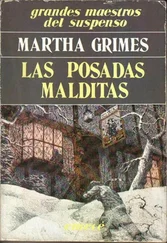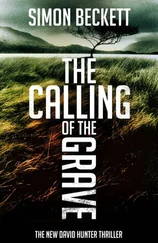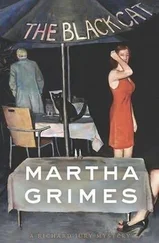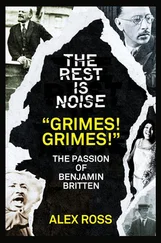“I was that cynical when I was a kid?”
“Pretty much. You could never convince Nell of it, though.”
Vernon suddenly leaned back. Anytime she was brought into a conversation abruptly, like that, out of the clear blue, as just now, he always felt he’d been punched suddenly in the chest. In the stall, perhaps everywhere, came a sudden stillness as if everything were holding its breath.
Vernon certainly was.
Nell.
Even at fifteen she’d been brilliant. When he’d first seen her, she was in Samarkand’s stall, rubbing him down after a ride. She was bent over. Her remarkably fair hair was long and covered her face, almost reaching the ground when she was bent over that way. She was quietly singing. It was a song he couldn’t make out but thought he knew.
“Hey,” he’d said, “what’s up?”
She straightened, surprised. Then she drew her hair back from a face that had seemed to him translucent. Nothing was hiding; everything was in it-how she cared for the horse and expected a lot more from it than she did from Vernon.
The “Hey, what’s up?” sounded more like the banal introduction of a kid, not a thirty-four-year-old adult, which he had been. “I’m Vernon Rice.”
“Hello.” She wiped her hand down the leg of her jeans and held it out.
He clasped it and thought whimsically of an iron butterfly, soft but very strong. It seemed to curl within his own hand. He was not given to metaphors usually.
“This,” she said, “is Samarkand. Sam, for short.”
He had lumps of sugar in his pocket that he’d picked up from the restaurant he’d stopped at for coffee. He was going, after all, to a stud farm. He liked to be prepared. Prepared? Was he going to offer a hedge fund to a horse? Now he pulled two of the cubes out of his pocket and held them out (rather timidly) toward the horse.
Samarkand looked at him, turned around in the stall (making Nell press against the wall) and presented his backside to Vernon.
“He’s not that easy,” Nellie said. She couldn’t help laughing.
He was ashamed of himself for blushing. My God. “That was pretty stupid of me, with the sugar, I mean.”
“Not at all. The important thing is you thought ahead, you came prepared. You know how many people manage to do that?” She made a circle with her thumb and forefinger. “Zilch.”
Now, he was as stupidly glad he’d brought the sugar as a moment ago he’d been stupidly ashamed.
Nimbly, she changed the subject, as if she’d had a lot of practice putting people at their ease, saying, “You’re down from London, aren’t you?”
“That’s right. I know I should have come before to meet the family. I was living in Europe for a little while, now-” He shrugged. “It was rude of me not to come the minute I got back.” He felt chastised without her saying anything; he realized he was chastising himself.
She had turned Samarkand back around without seeming to have touched him. She said, “It certainly wasn’t as rude as their going off to a registry office and not inviting us.” That she was not really annoyed by this “elopement” of his mother and her grandfather was clear. She had said it to let him know they were both on the same side. “I like Felicity; she’s really nice.”
“Excuse me for getting personal, but are you really fifteen?”
His expression made her laugh. “That’s all, sorry to say.”
“You seem so much older.”
She stopped the curry comb and looked off somewhere. “It’s from being around horses all my life, I think. I think it gives a person poise.” She had finished with the brushing and returned the brush to a shelf and picked up a bucket.
He was afraid she was going, and he wanted to keep her there. “What was that song you were singing?”
Color rose slowly up her neck and across her face. He’d seen sunrises that couldn’t hold a candle. “ ‘Love Walked In.’ ”
He remembered the song. “ ‘And drove the shadows away.’ ” He smiled.
So did she. “One of my favorites. Do you know all the words?”
“No. Some, but not all. Your voice is very pretty.” She shrugged that away.
“You don’t want anyone to hear you.”
“It’s embarrassing to be caught singing to horses. You know.”
She said this, to Vernon’s intense surprise, as if he must. Yet he did know, didn’t he? He remembered being fifteen and how hard it was, falling in love with girls you couldn’t have.
“What’s wrong? Did I spook you?” She swung the bucket a little.
His look now was quite serious. “You could say that.” She smiled and walked off, the bucket swinging from her gloved hand, trim and neat, hair nearly lost in the sun’s dazzle. Vernon watched her out of sight, thinking she was the most together person he’d ever known.
The day she went missing was the worst day of Vernon Rice’s life.
“Who was she?” asked Jury. Melrose Plant had the latest fruit basket on his lap, checking its contents. He looked up. “She? Your questions more and more seem to be coming out of some continuing conversation with yourself.”
“The woman in the pub.”
Melrose cocked his head, trying to tune in on Jury’s wavelength. The penny dropped. “Oh! In the Grave Maurice.”
Jury nodded. “The one who seemed to know Dr. Ryder.” Melrose pried a banana out of the basket.
“Don’t take that. Wiggins is Banana Man and has already spoken for it.”
“I’m not taking anything. I hope I’ve better things to do than rummage through fruit baskets.”
“You will in a while. This woman-”
“The entire hospital knew about that kidnapping. It wouldn’t mean the woman I overheard was any more important than the others.”
“I’m just casting about.”
Silence while Jury looked out of the window upon the blank face of the sky, and Melrose tried to decide between a plum and a pear. Why not have both?
Melrose said, his tone not very hopeful, “You were kidding?”
Jury frowned. “About what?”
“That I should go to Ryder Stud to buy a horse.”
“Yes.”
Melrose exhaled pent-up breath. “That’s a relief.” “What in hell would you do with a horse?”
“Exactly!”
“You can just negotiate.”
Melrose sat up. “Negotiate?”
“For the horse. You don’t actually buy it. Negotiating would allow you to go back, maybe more than once.”
Melrose slumped down in the chair. “Richard, I don’t want to know about horses; I’m still stuffed to the gills with hacheonela and Rumbrim grasses. With box parterres and… stuff.” He flapped his hand in Jury’s direction.
“You didn’t want to be a gardener, either, but you did a bang-up job. As always.” Jury smiled brightly, the smile quick to fade when Nurse Bell entered the room.
Seeing Melrose, she braced her legs, dug her fists into plump hips and said, “It isn’t visiting hours!”
“I’m not visiting; I live here.”
She waggled a finger in the air. “I’ve spoken to you before about this, Mr. Plant. You cannot take these liberties-”
Melrose stood up, digging one of his old cards from his tweed pocket. “It’s Lord Ardry, actually, Earl of Caverness, Baron of Ross and Cromarty, et cetera.” He handed her the shabby card.
She looked at it. “Well…” She smiled at him coyly, displaying teeth that could use a dentist or a crane. “Still, we’ve got to be careful about maintaining proper hours.” Her finger wagged again, but in a more friendly fashion. “We’ve got to see our patients get their rest.” She had drawn out a thermometer, shaken it and now shoved it into Jury’s mouth. She talked all the while she took his pulse. “Things could so easily turn against them, I mean the patients. Just last week there was an elderly gentleman who’d come in with a bad heart. Fit as a fiddle, he looked”-she checked her watch and chuckled-“and then wouldn’t you know it, he slumped over in his wheelchair when the attendant was wheeling him toward the visitors’ room. His daughter and grandchildren were waiting for him and just as he raised his hand to wave-that’s enough,” said the nurse to Jury as she yanked the thermometer from his mouth (as if it were a lollipop he’d been licking) “-and as the little grandson was rushing toward the old man, he went down like this!” She snapped two fingers. “Never got to say good-bye, he didn’t. Then there was the poor little girl that came in with her appendix-”
Читать дальше
